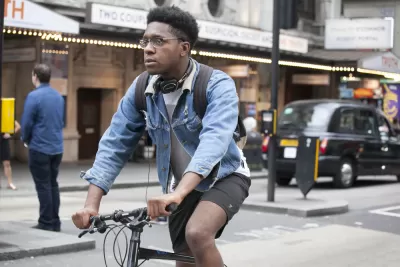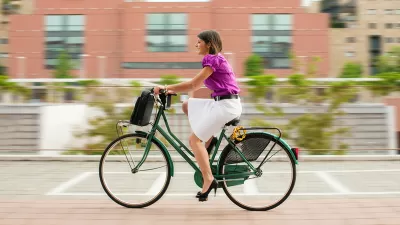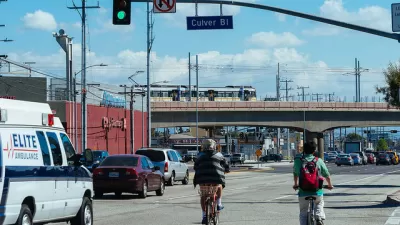Bike commuters are increasing in some cities, but overall, fewer Americans are biking to work.

Chris Woodyard reports: "After rising for several years, the percentage of commuters turning to bikes declined for the third year straight, U.S. Census Bureau figures show."
"Nationally, the percentage of people who say they use a bike to get to work fell by 3.2 percent from 2016 to 2017, to an average of 836,569 commuters, according to the bureau's latest American Community Survey….That's down from a high of 904,463 in 2014, when it peaked after four straight years of increases."
According to Woodyard, the decrease is more drastic in some cities than others. Biking to work declined by 50 percent in Tampa and Cleveland, for instance. Bike commuting also decreased in Seattle, Portland, San Francisco, Oakland, and New Orleans. Still, bike commuting increased in Minneapolis, Denver, D.C., and Philadelphia.
Dave Snyder, executive director of the California Bicycle Coalition, is paraphrased in the article, crediting (blaming?) lower gasoline prices and a stronger economy increasing auto sales and decreasing interest in alternative modes of transportation.
FULL STORY: Fewer Americans bike to work despite new trails, lanes and bicycle share programs

Planetizen Federal Action Tracker
A weekly monitor of how Trump’s orders and actions are impacting planners and planning in America.

Maui's Vacation Rental Debate Turns Ugly
Verbal attacks, misinformation campaigns and fistfights plague a high-stakes debate to convert thousands of vacation rentals into long-term housing.

San Francisco Suspends Traffic Calming Amidst Record Deaths
Citing “a challenging fiscal landscape,” the city will cease the program on the heels of 42 traffic deaths, including 24 pedestrians.

Amtrak Rolls Out New Orleans to Alabama “Mardi Gras” Train
The new service will operate morning and evening departures between Mobile and New Orleans.

The Subversive Car-Free Guide to Trump's Great American Road Trip
Car-free ways to access Chicagoland’s best tourist attractions.

San Antonio and Austin are Fusing Into one Massive Megaregion
The region spanning the two central Texas cities is growing fast, posing challenges for local infrastructure and water supplies.
Urban Design for Planners 1: Software Tools
This six-course series explores essential urban design concepts using open source software and equips planners with the tools they need to participate fully in the urban design process.
Planning for Universal Design
Learn the tools for implementing Universal Design in planning regulations.
Heyer Gruel & Associates PA
JM Goldson LLC
Custer County Colorado
City of Camden Redevelopment Agency
City of Astoria
Transportation Research & Education Center (TREC) at Portland State University
Jefferson Parish Government
Camden Redevelopment Agency
City of Claremont





























